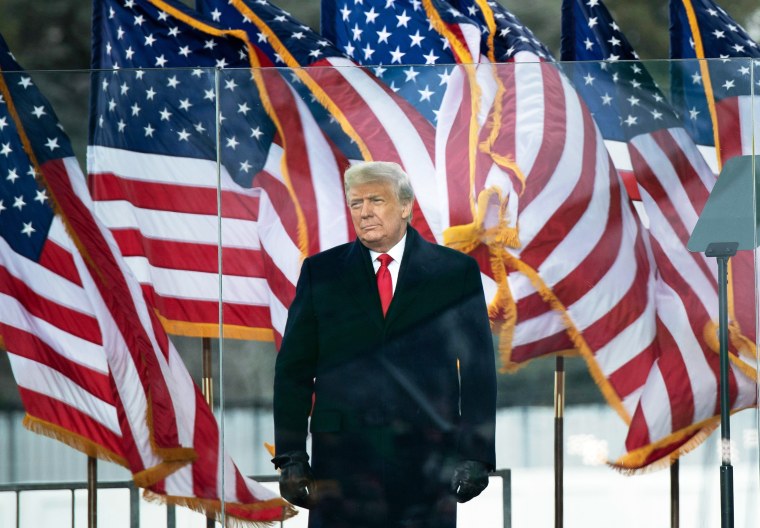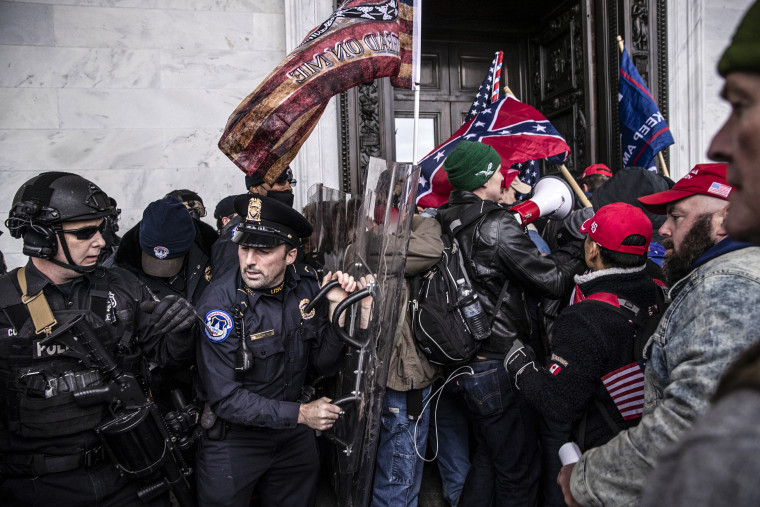WASHINGTON — The Justice Department said Thursday that police officers can sue former President Donald Trump over the violence at the Capitol on Jan. 6, 2021.
Attorneys for the Justice Department's Civil Division said in a court filing in the U.S. Circuit Court of Appeals for the District of Columbia that Trump does not have absolute immunity from multiple civil lawsuits, filed by police officers and members of Congress, that seek to hold him liable for damages stemming from the riot.
"Speaking to the public on matters of public concern is a traditional function of the presidency, and the outer perimeter of the president’s office includes a vast realm of such speech," the brief said. "But that traditional function is one of public communication. It does not include incitement of imminent private violence of the sort the district court found that plaintiffs’ complaints have plausibly alleged here."

The brief, which carefully avoids taking a position on whether Trump is actually liable for causing the riot, civilly or criminally, urges the appeals court to reject Trump’s immunity claim and return the cases to a lower court for further litigation.
“Such a narrow decision would leave for further proceedings in the district court (and, if necessary, a future appeal) any renewed assertion of absolute immunity more narrowly focused on whether the former president’s speech actually constituted incitement,” the Justice Department lawyers wrote.
Two Capitol Police officers, James Blassingame and Sidney Hemby, and 11 members of Congress are seeking to hold Trump liable for injuries or damage caused during the riot.
U.S. District Judge Amit Mehta first rejected Trump’s immunity claim in February 2022, ruling that the speech Trump gave during the Jan. 6 rally on the Ellipse cannot be considered part of his official presidential duties.
“The president’s actions here do not relate to his duties of faithfully executing the laws, conducting foreign affairs, commanding the armed forces, or managing the executive branch,” Mehta wrote at the time. “They entire concern his efforts to remain in office for a second term. These are unofficial acts, so the separation-of-powers concerns that justify the president’s broad immunity are not present here.”

In August, Mehta denied Trump’s bid to dismiss three lawsuits brought by police officers injured in the riot, rejecting his assertion that he is “absolutely immune” from the claims.
Meanwhile, the longtime partner of Capitol Police Officer Brian Sicknick, 42, who died a day after the riot, filed a wrongful death lawsuit in January against Trump and two men involved in assaulting Sicknick.
Washington’s chief medical examiner ruled in April 2021 that Sicknick died of natural causes after having suffered two strokes.
The civil suit by the late officer's partner, Sandra Garza, blames Trump for a barrage of lies he told about the election in the lead-up to the Jan. 6 riot and accuses him of inciting the crowd to violence. The suit seeks $10 million from Trump and $10 million each from two men convicted in connection with the assault on Sicknick, Julian Khater and George Tanios.
Trump’s lawyers have argued he was acting within the bounds of his official duties and had no intention to spark violence when he called on thousands of supporters to “march to the Capitol” and “fight like hell” before the riot erupted.
